Benefits of Parent-Led ABA Therapy at Home
Empowering Families: How Parent-Led ABA Therapy Transforms Autism Support at Home

Understanding the Foundations and Advantages of Parent-Led ABA Therapy
Applied Behavior Analysis (ABA) therapy has long been recognized as an effective evidence-based treatment for children with autism spectrum disorder (ASD). Traditionally administered by trained professionals, ABA therapy is increasingly evolving through parent-led models, which empower families to actively participate in their child's developmental progress. This article explores the benefits of parent-led ABA therapy at home, examining how it enhances skill development, supports family dynamics, and improves outcomes for children with autism.
What is ABA Therapy and How Does It Benefit Children with Autism?
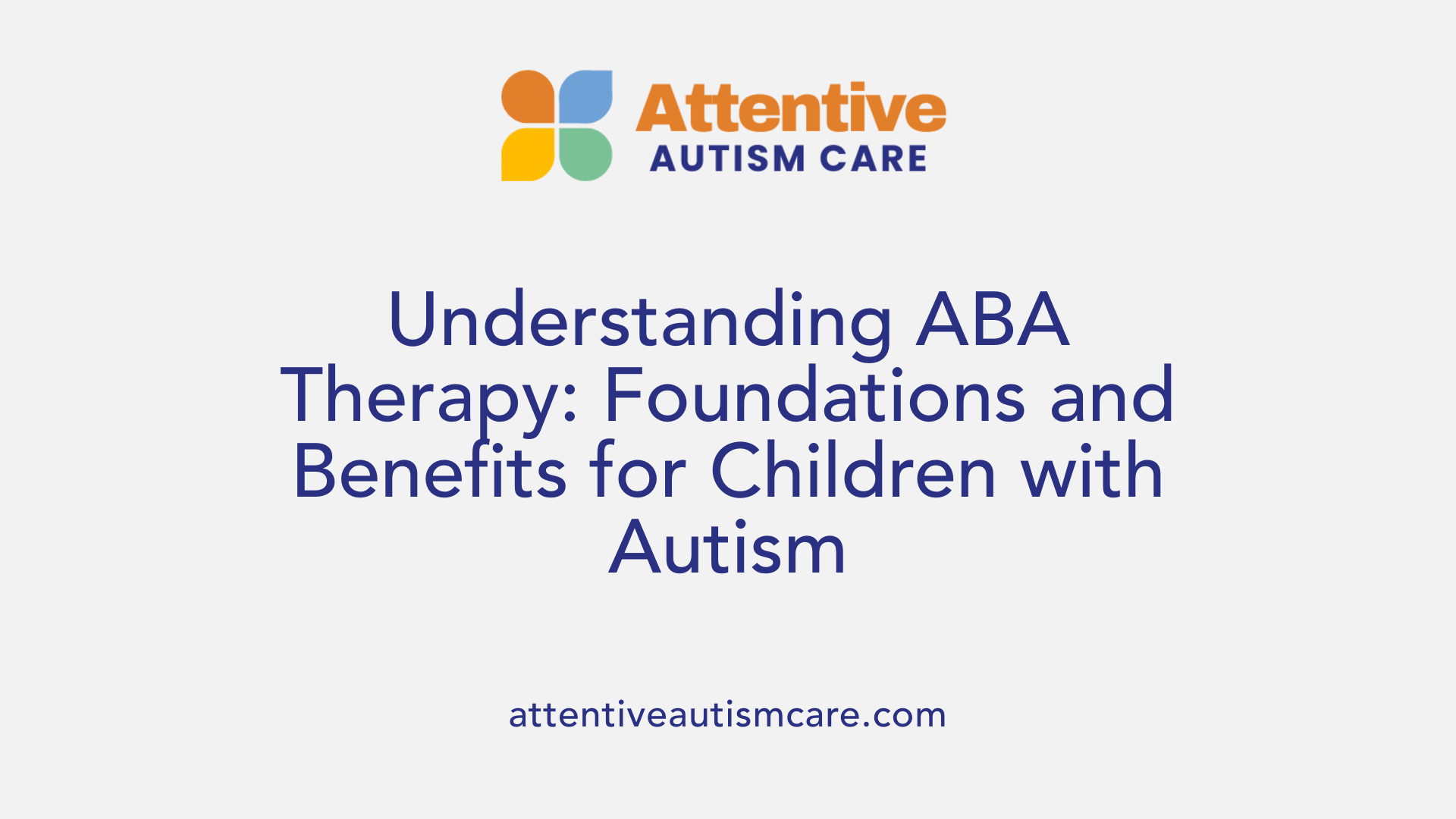
What is Applied Behavior Analysis (ABA) therapy?
Applied Behavior Analysis (ABA) therapy is a scientifically-supported method that studies how behavior is affected by the environment and learning. It focuses on promoting positive behaviors like communication, social interaction, and daily living skills, while minimizing behaviors that might interfere with learning or wellbeing. ABA uses techniques such as positive reinforcement to encourage desired behaviors. Programs are tailored for each person's specific needs and can be provided in settings like homes, schools, or clinics. Trained professionals, such as Board Certified Behavior Analysts (BCBAs), design and oversee these personalized plans.
How does ABA therapy support communication, social skills, and daily living?
ABA therapy helps children with autism develop essential skills by reinforcing helpful behaviors and reducing challenging ones. It targets areas including communication, social interaction, self-care, and academic abilities to promote independence. Detailed data collection tracks progress, allowing for goals to be adjusted. Early, intensive ABA therapy can lead to notable improvements in language and cognitive abilities, enhancing quality of life for children and their families.
What are common methods and techniques used in ABA therapy?
ABA therapy employs several proven techniques:
- Positive Reinforcement: Rewarding good behavior to encourage its recurrence.
- Discrete Trial Training (DTT): Breaking skills into small parts and teaching them individually.
- Prompting and Fading: Guiding a child toward correct responses and gradually reducing assistance.
- Natural Environment Teaching (NET): Using everyday settings to teach new skills.
- Visual Supports: Tools like video modeling and charts to aid learning. These strategies are adapted to each child’s needs to increase communication, social skills, and independence.
Who provides ABA therapy and how is it administered?
ABA therapy is administered by trained professionals such as BCBAs who supervise and design individualized treatments. Therapy assistants often implement daily interventions under their guidance. Sessions can take place in various environments including homes, schools, and community settings. Continuous progress monitoring ensures treatments are effective and adjusted when necessary to optimize outcomes.
| Aspect | Description | Details |
|---|---|---|
| Definition | A science-based approach to understanding and improving behavior | Uses learning principles to increase positive behaviors and reduce problematic ones |
| Skills Targeted | Communication, social, daily living skills | Focuses on independence and adaptive skills |
| Methods | Positive reinforcement, DTT, NET, prompting, visual aids | Tailored to individual child's needs and settings |
| Providers | Board Certified Behavior Analysts and trained therapists | Oversee and implement treatment across home, school, and community environments |
The Rise and Impact of Parent-Mediated ABA Therapy at Home
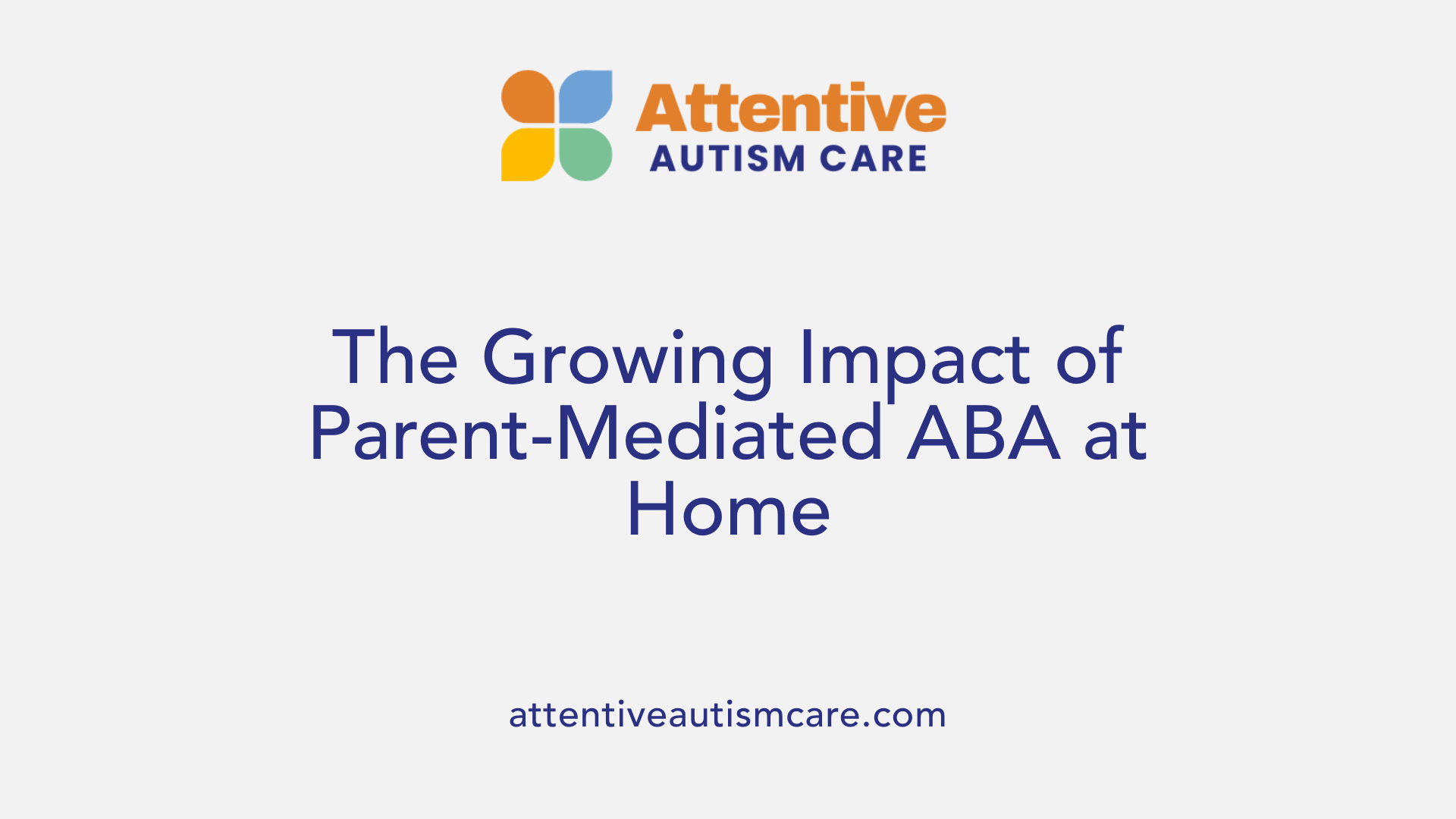
What is Applied Behavior Analysis (ABA) therapy?
Applied Behavior Analysis (ABA) therapy is a scientifically grounded approach that focuses on improving behavior by understanding environmental influences. It aims to enhance communication, social skills, and daily living activities while reducing negative behaviors through methods like positive reinforcement. ABA is tailored individually and delivered in settings such as home or school under professional supervision.
Definition and overview of parent-mediated ABA
Parent-Mediated ABA is an adaptation where parents are trained to apply ABA techniques themselves. This method empowers parents to directly support and teach their child, creating more personalized and flexible interventions. It fosters a partnership between therapists and families, making therapy more accessible and consistent.
Effectiveness compared to professional-led ABA
Research led by Catalight has shown Parent-Mediated ABA can be as effective as paraprofessional-led therapy in improving communication, social skills, and daily living activities. Moreover, studies indicated that parents involved in these programs experience increased self-efficacy and reduced stress, which enhances the overall family environment.
Integration into daily routines
A significant advantage of Parent-Mediated ABA is its seamless integration into everyday life. Parents can embed learning opportunities during natural routines like car rides, mealtimes, and waiting periods. This naturalistic approach reduces disruption and increases practical learning contexts.
Benefits for skill development and behavior management
Parents trained in ABA techniques contribute to faster skill acquisition and better long-term retention in their children. They learn strategies for reinforcement, prompting, and managing challenging behaviors effectively. This leads to reduced disruptive behaviors and improved adaptation. Furthermore, parent-led interventions have been shown to enhance family dynamics by promoting calm responses and better communication.
| Aspect | Description | Impact on Families and Children |
|---|---|---|
| Parent-Mediated ABA | Parents applying ABA techniques with training | Builds confidence, reduces stress, and fosters consistency |
| Professional-led ABA | Therapy delivered mainly by trained paraprofessionals | Effective but less flexible in natural settings |
| Daily Routine Integration | Learning embedded into daily activities | Makes therapy less disruptive and more continuous |
| Skill Development | Use of reinforcement, prompting, and behavior management | Faster progress and better behavioral outcomes |
The growing role of parents in ABA therapy underscores the critical importance of family involvement in the success of autism interventions. Parent-Mediated ABA not only supports children’s development but also empowers caregivers, creating happier homes and stronger futures.
Strengthening Families: How Parent Training Enhances Home Therapy Success
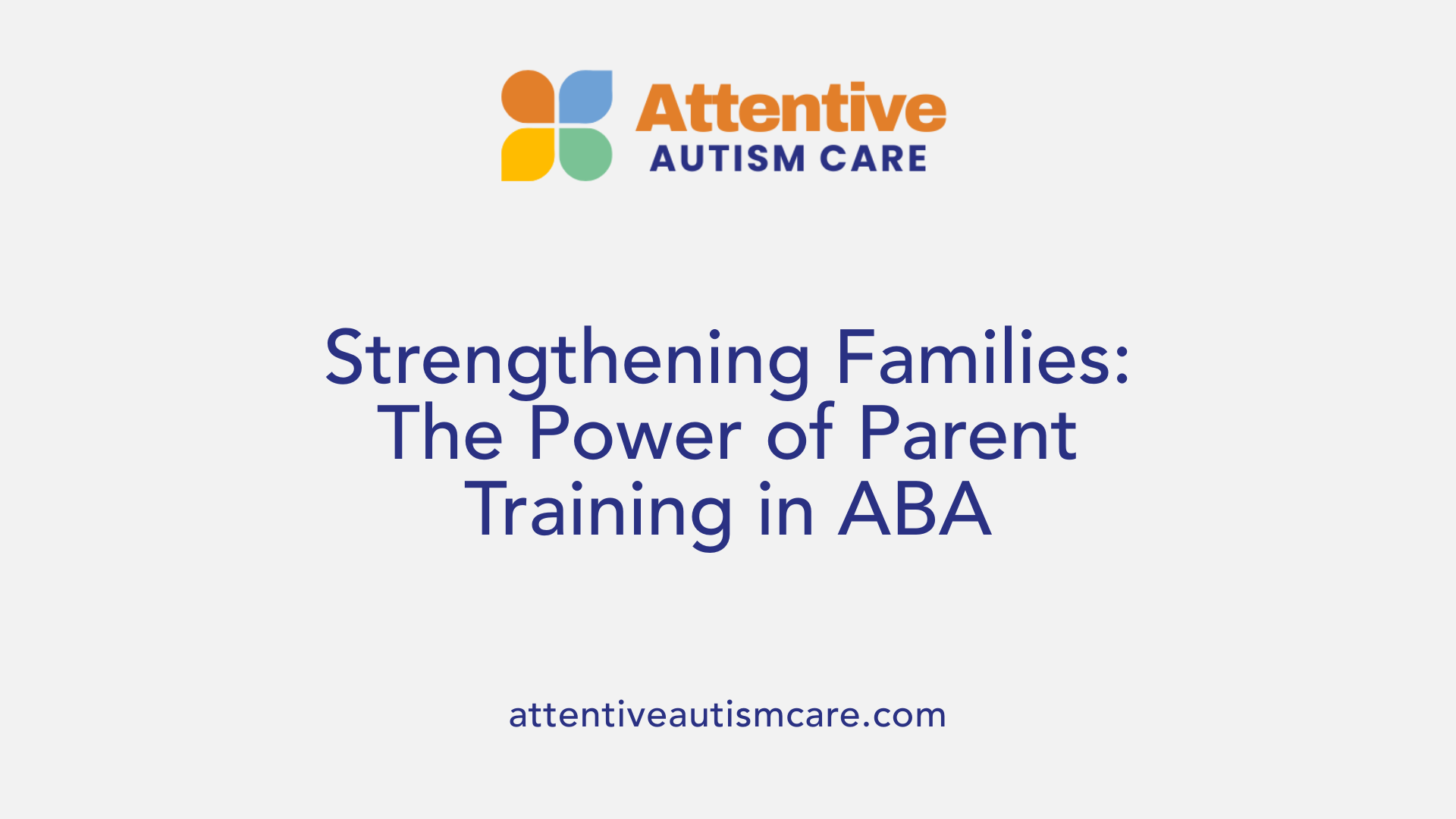
How Does Parent Training Reduce Stress and Increase Parental Confidence?
Parent training in ABA therapy has been shown to greatly improve parental self-efficacy—the confidence caregivers feel in managing their child's needs. Studies demonstrate a clear negative relationship between parental self-efficacy and stress, meaning as parents become more skilled and confident, their stress levels tend to decrease significantly. In fact, research involving thousands of children with autism spectrum disorder (ASD) found that parents leading ABA interventions experienced meaningful boosts in self-efficacy, unlike those in practitioner-led groups.
What Techniques Are Taught to Parents in ABA Training?
Training programs like those at Breakthrough ABA combine various methods to equip parents effectively. Core skills include:
- Using reinforcement to encourage positive behaviors
- Applying prompting and fading to support skill acquisition
- Managing meltdowns and challenging behaviors calmly
- Increasing communication and language skills
- Building consistent daily routines
How Does Parent Training Improve Family Dynamics and Coping?
With structured education and hands-on coaching, parents learn to identify why behaviors occur—such as seeking attention or avoiding situations—and tailor their responses. This knowledge empowers caregivers to respond calmly and consistently, reducing frustration and creating a calmer household environment. Improved communication between parents and children often leads to stronger family bonds and enhanced coping strategies under stress.
What Are Examples of Effective Parent Training Methods?
Successful ABA parent training includes a variety of practical approaches:
- One-on-One Coaching: Personalized sessions guiding parents through techniques.
- Live Feedback: Real-time suggestions during parent-child interactions.
- Role-Playing: Practicing scenarios to build skills.
- Home Practice: Applying techniques in natural environments.
- Visual Aids and Video Modeling: Using videos and images to demonstrate effective strategies.
Through these methods, parents develop the skills needed to seamlessly integrate ABA therapy into daily life, such as during mealtimes, car rides, or waiting periods. This ongoing partnership enhances the therapy’s effectiveness and builds a supportive and confident family atmosphere.
Addressing Criticisms of ABA Therapy
It is important to acknowledge that ABA therapy faces criticisms for sometimes being overly rigid or promoting compliance at the expense of emotional well-being. Concerns include the potential for reinforcing masking behaviors, which might lead to emotional distress or trauma. However, many professionals emphasize that with well-designed, parent-involved approaches, ABA can be flexible and individualized, prioritizing the child’s positive development and authentic self-expression without harm.
| Aspect | Description | Benefits to Families |
|---|---|---|
| Parental Self-Efficacy | Parents gain skills and confidence in managing behaviors | Reduced stress and increased family harmony |
| Techniques Taught | Reinforcement, prompting, meltdown management, communication | Better child outcomes and consistent progress |
| Improved Family Dynamics | Calm responses, understanding behavior functions, effective communication | Stronger relationships and lower frustration |
| Training Methods | Coaching, live feedback, role-playing, practice, video modeling | Practical skill building and real-life application |
Parent-mediated ABA therapy not only promotes better child outcomes but also creates empowered, resilient families equipped to navigate challenges and celebrate milestones together.
Why Parent-Led Reinforcement Accelerates Developmental Progress
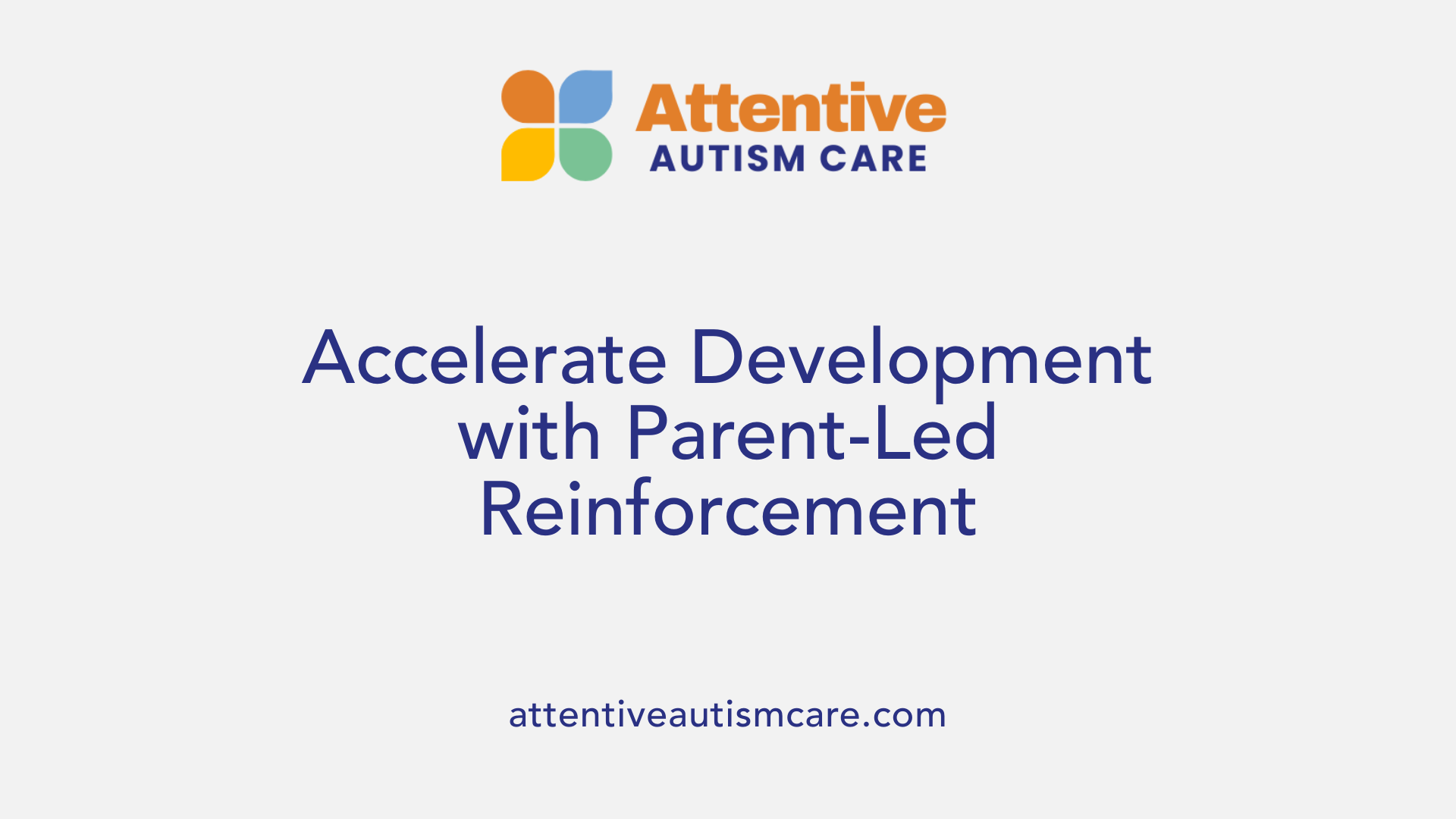
How parent-led reinforcement speeds skill acquisition
Parent-led reinforcement in ABA therapy speeds up skill acquisition by providing immediate, consistent guidance in natural settings. Parents, trained to use specific ABA techniques like reinforcement, prompting, and fading, can respond to behaviors promptly during daily routines. This continuous interaction encourages quicker mastery of skills because learning opportunities are embedded throughout the day rather than limited to scheduled therapy sessions.
Consistency and generalization across settings
Consistency is crucial for effective ABA therapy, and when parents lead reinforcement, it ensures that strategies are applied uniformly across different environments such as home, school, and community. This consistency helps children generalize skills learned in therapy to real-life situations, making their progress more sustainable and broad-reaching.
Research supporting faster progress with parent involvement
Studies have demonstrated that parent-mediated ABA can be as effective as therapist-led approaches in improving communication, social skills, and daily living activities. Notably, parent-led reinforcement contributes to faster progress toward goals, fewer setbacks, and better long-term retention of skills. Enhanced parental self-efficacy correlates with reduced stress, creating a more positive family atmosphere that supports ongoing development.
Impact on communication, social skills, and adaptive behavior
Parent-led ABA interventions have been shown to significantly improve communication and adaptive behaviors in children with autism. By involving parents actively, the therapy becomes more natural and flexible, which helps children better engage socially and develop crucial life skills. This approach leads to improved quality of life for both children and their families, strengthening family dynamics and empowering caregivers to confidently support their child's growth.
The Evidence Behind Parent-Mediated ABA: Research Insights
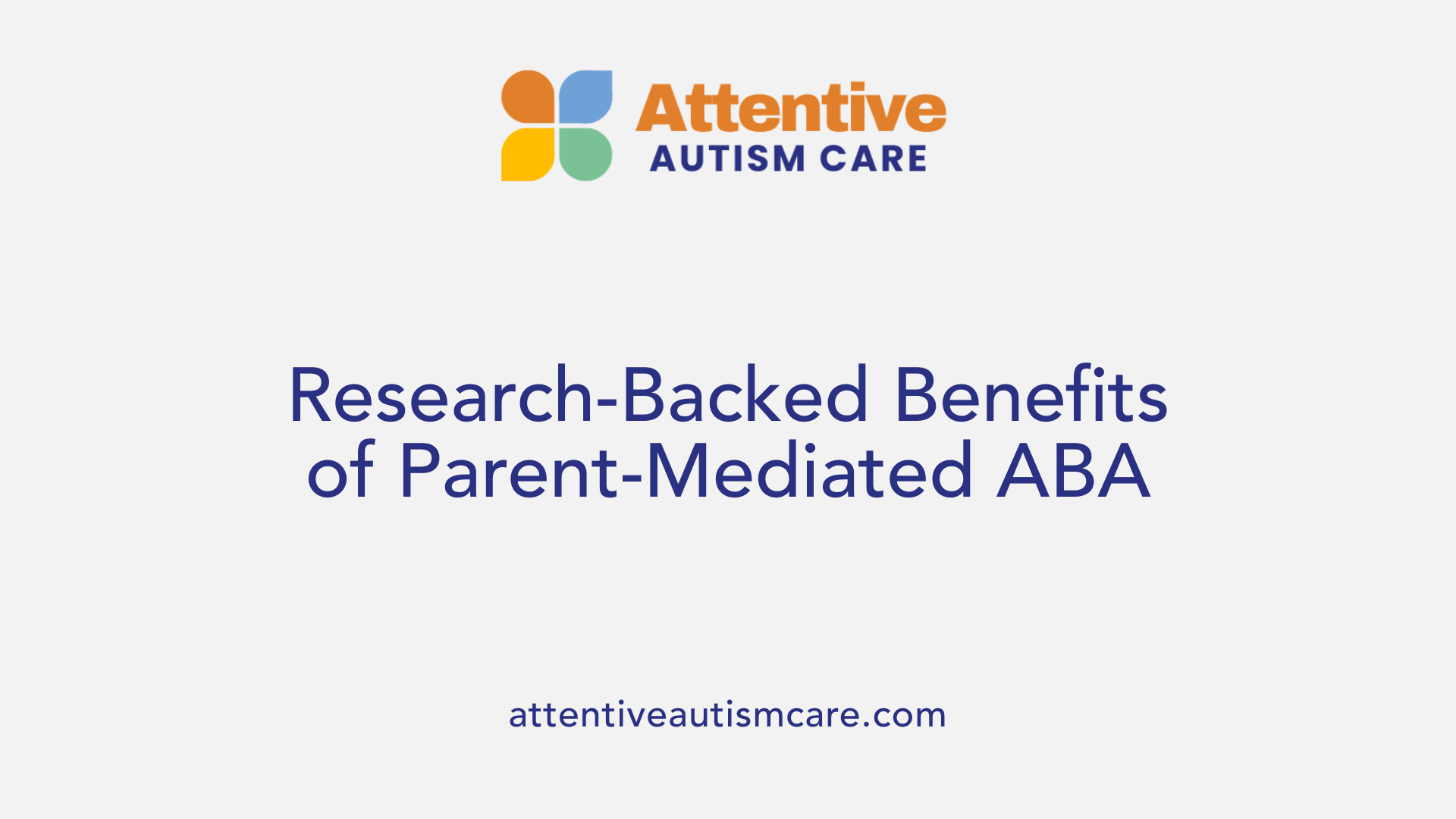
Who provides ABA therapy and how is it administered?
ABA therapy is typically delivered by trained professionals such as Board Certified Behavior Analysts (BCBAs) who design and supervise personalized treatment plans. These plans are executed by therapy assistants or other trained staff under their guidance. Therapy can take place in diverse environments like homes, schools, clinics, or community spaces, using proven techniques like positive reinforcement and natural environment teaching to promote skill development.
How do parent-led and practitioner-led ABA compare?
Recent research led by Catalight reveals that Parent-Mediated ABA can be just as effective as therapist-led ABA in enhancing communication, social abilities, and daily living skills in children with autism. This demonstrates that parents empowered with ABA training can successfully support meaningful progress.
What are the effects on parental self-efficacy and stress?
Parent training in ABA not only enhances treatment outcomes but also builds parental confidence and reduces stress. A comprehensive study involving data from over 2,276 children found a significant negative correlation between parental self-efficacy and stress — meaning as parents feel more competent, their stress levels decrease. Notably, parents actively involved in ABA reported greater gains in self-efficacy compared to those in practitioner-led models.
What statistical findings support parent-mediated ABA?
In a large-scale analysis, parental self-efficacy accounted for 21% of the variance in parenting stress, highlighting the importance of empowering parents through training. Data comparing groups receiving parent-led versus practitioner-led interventions showed clear benefits for parent-led approaches in fostering caregiver confidence and reducing stress.
What implications do these findings have for future autism therapy?
These insights stress the vital role of parents in ABA treatment and suggest incorporating parent training as a standard part of therapy programs. Increasing parental involvement creates more consistent learning environments, accelerates children’s progress, and promotes healthier family dynamics. Emphasizing collaboration between professionals and caregivers can make autism interventions more effective and sustainable in real-life settings.
Parent-Led ABA Therapy: Building Confident Families and Brighter Futures
Parent-led ABA therapy at home represents a transformative approach to supporting children with autism by involving caregivers directly in the therapeutic process. Backed by rigorous research highlighting its effectiveness, this model fosters faster developmental progress, greater consistency across environments, and significant reductions in parental stress through increased self-efficacy. Beyond skill acquisition, parent-mediated ABA enhances family dynamics and empowers caregivers to respond skillfully to challenges. While professional oversight remains essential, integrating parents as active partners enriches therapy outcomes and contributes to happier, more resilient families. As awareness grows, parent-led ABA is poised to become a cornerstone in holistic, family-centered autism care.
References
- The Power of Parent-Mediated
- How Parent Training Enhances ABA Success at Home 👨👩👧
- The Importance of Parental Involvement in ABA Therapy
- "Parent-Led Applied Behavior Analysis on Parent Stress and ...
- Applied Behavior Analysis (ABA)
- Behind the Scenes: Vital Role of an ABA Therapy Specialist
- What Do ABA Therapists Do?
- Applied Behavior Analysis (ABA)
- Applied Behavior Analysis (ABA)



































































































